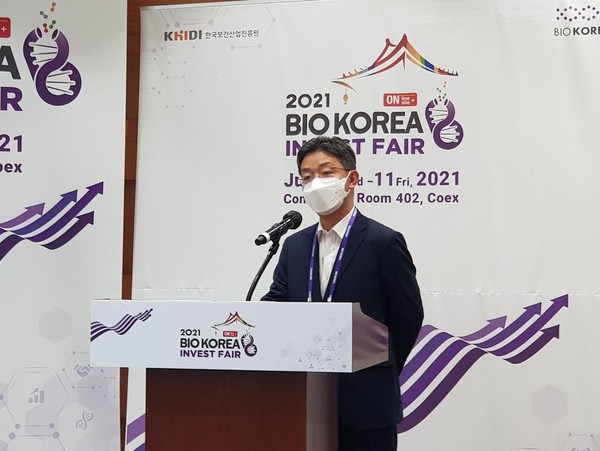“Korea has been a ‘barren land’ for CAR-T (chimeric antigen receptor-T) cell therapy. But after Curocell won approval for a clinical trial this year for the first time, the door to the market has opened.”
So said Curocell CEO Kim Gun-soo, expressing his pride at the Invest Fair during Bio Korea 2021, an international convention for the bio-health industry held at COEX, Seoul, Thursday.
Kim explained the general concept of CAR-T cell therapy, Curocell’s technology OVIS, and plans for clinical trials.

Mentioning the overall production process for CAR-T cell therapy, Kim emphasized the importance of infrastructure for manufacturing and administering CAR-T cell therapy.
“Unlike conventional therapies, CAR-T cell therapy needs a hospital’s important role. While conventional drugs are sent to hospitals as finished goods, CAR-T cell therapy requires a process where the hospital has to collect, freeze, and thaw the patient’s cells,” Kim said.
To produce CAR-T cell therapy, the hospital has to collect the patient’s T cells using leukapheresis. Only white blood cells are collected during this procedure, and all the other blood cells and plasma are returned to the bloodstream. The hospital freezes the T cells and sends them to the drugmaker. Then, the drugmaker expresses CAR that responds to cancer cells in the T cells, it can create CAR-T cell therapy. The drugmaker freezes the treatment and sends it to the hospital, which thaws it and administers it to the patient.
“Curocell is closely working with Samsung Medical Center. We’re using the hospital’s GMP facility, and we can manufacture CAR-T cell therapy for about 100 patients annually,” Kim said.
Citing an overseas case of commercializing CAR-T cell therapy, Kim predicted that Curocell could commercialize the treatment quickly.
The development of Yescarta took less than 36 months because the response to CAR-T cell therapy can be assessed within 30 to 60 days after a single administration, he explained.
Curocell obtained the nod for the phase-1 trial of CRC01, a CD19 CAR-T cell therapy candidate, in February. As a result, the company is the first in Korea to enter a clinical trial of CAR-T cell therapy.
The company plans to evaluate the safety in the phase-1 study, where it will divide the cohort into three different doses. Curocell intends to complete the study this year, enter a phase-2 trial in 2022, and apply for conditional approval later.
Curocell has developed a unique CAR-T platform called OVIS.
“Our CAR-T cell therapy lowers the expression of immune checkpoint receptor PD-1 and TIGIT,” Kim said. “Theoretically, our product has the traits of both CAR-T and immune checkpoint receptor inhibitor.”
CAR-T cell therapy could yield dramatic response effects, but there are also challenges, Kim noted.
According to Kim, in some patients treated with CAR-T cell therapy targeting CD19, cancer could recur one year after the treatment or later due to antigen loss. “How to solve this problem is a challenge for us,” he said.
Another challenge is people’s perception that CAR-T cell therapy is its exorbitant price.
“As I mentioned earlier, all these procedures have to take place for one single patient. So, the drug price is very high,” Kim said.
CAR-T cell therapy in the U.S. is estimated to cost about 500 million won ($449,668), and using additional drugs to address adverse reactions could raise the cost up to 1 billion won, he said.
“Our goal is to make our CAR-T cell therapy first-in-class in solid cancer,” he added.

